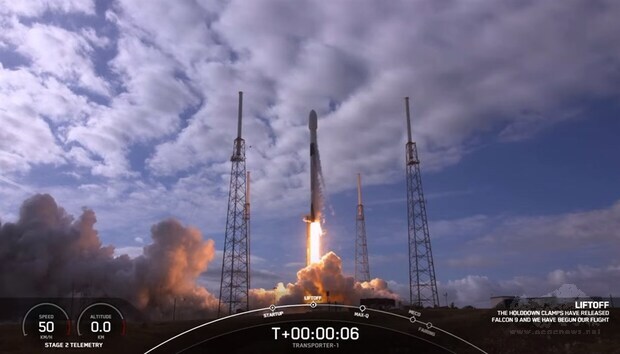
After a three-day delay caused by safety inspections and weather issues, the Flying Squirrel and Yushan satellites were sent into orbit by SpaceX's Falcon 9 rocket.
The Flying Squirrel, a miniature "CubeSat" satellite developed by National Central University, will be used to research how plasma in the earth's ionsphere, or upper atmosphere, affects radio waves, which are used for communication in 5G networks.
Chao Chi-kuang, a professor in the university's Space Payload Laboratory, said the satellite will use a plasma sensor that is basically a miniaturized version of the one on Taiwan's FormoSat-5 satellite, which was launched in 2017.
While the FormoSat-5 weighed 450 kilograms and cost NT$5.6 billion (US$200.1 million) to produce, the Flying Squirrel weighs only 4.5 kg and cost NT$40 million, he said.
The other satellite, the Yushan, was produced by New Taipei-based MoGaMe Mobile Entertainment, and will primarily be used to monitor marine traffic.
Specifically, the satellite contains equipment for detecting data from two widely used vessel tracking systems, the automatic identification system (AIS) and automatic packet reporting system (APRS), according to MoGaMe founder Anson Tai.
The Yushan weighs about 2 kg and cost NT$4.4 million to produce, he said.
Taiwan's Ministry of Science and Technology has praised the launch as the culmination of more than three years of work spent developing the satellites.
In contrast to Taiwan's FormoSat-5 and 7 satellites, which weighed 450 and 300 kg, respectively, the ministry said, the new generation of satellites consists mainly of nano-satellites (weighing 1-10 kg) and pico-satellites (weighing 0.1-1 kg), which has made space research cheaper and more widely accessible.
According to the ministry, National Formosa University has also designed a satellite, the Nut, which will be used for flight tracking, and it is expected to be launched in June.